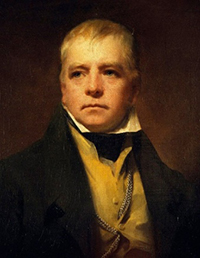People often blame fate on what is a direct consequence of their own violent passions.
Walter Scott

The writer was born in the Scottish capital, Edinburgh, on August 15, 1771. His father was a successful wealthy lawyer. When he was very young, Walter had polio, which made him lame for life.The surrounding people were surprised at the boy's magnificent memory and mobile mind. His childhood years were spent on his grandfather's farm and at his uncle's house near Kelso. Walter returned to his hometown in 1778, and the following year he became a student of the metropolitan school. In 1785, he was educated at Edinburgh College. Within the walls of this educational institution, he and a group of friends created a "Poetic Society", was fond of German poets, studied the German language. In 1792, after graduating from the University of Edinburgh, he received a law degree.
In the field of literature, he made his first appearance, translating two poems by the German poet Burger in 1796, but the reading public did not react to them. Nevertheless, Scott did not stop studying literature, and in his biography there was always a combination of two roles – a lawyer and a writer. At the end of 1799, he became the chief judge in the county of Selkyrshire and remained in this position until his death.Published in 1802-1803, three volumes of" Poetry of the Scottish Border " made him a famous person. Published in 1805, the poem entitled "The Song of the Last Minstrel" was very popular not only in Scotland, but also in England, in years and weeks it was reread, passages were recited by heart. A number of other poems, as well as a collection of lyrical poems and ballads published in 1806, allowed Scott to join the glorious cohort of British romantics. With some of them, in particular, with Byron, Wordsworth, Coleridge, Scott was personally acquainted and was on friendly terms.
Of the 26 works of this genre, only one," St. Ronan's Waters", covered contemporary events, while the rest describe mainly the past of Scotland. The first novel, called "Waverley", was published in 1814, and the author preferred to hide his name, which he did for more than 10 years, for which the public called him the Great Incognito. In 1820, George IV awarded Walter Scott the title of baronet. During the 20-30s. he not only wrote novels ("Ivanhoe", "Quentin Dorward", "Robert, Count of Paris"), but also undertook a number of historical studies (published in 1829-1830 two volumes of "History of Scotland", and a nine-volume "Life of Napoleon" which was published in 1831-1832)).
Literary creativity brought Walter Scott a lot of money. However, because of the publisher and the printer, he went bankrupt; being forced to pay large debts, he worked at the limit of his intellectual and physical capabilities. The novels of the last years of his life were written by a sick and incredibly tired person, which affected their artistic merits. However, the best works of this genre became classics of world literature and determined the vector of further development of the European novel of the XIX century, significantly influencing the work of such major writers as Balzac, Hugo, Stendhal, etc.
On September 21, 1832, Walter Scott died of a heart attack in Abbotsford, Scotland; Dryburgh became the burial place.
Nazira Artykbayeva, librarian of the International Book Department

